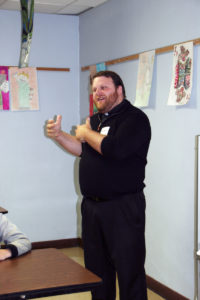By Fr. Corey Close
This past month I had the privilege to attend a yearly event held in Cedar Falls, Iowa, called the Newly Ordained Convocation. Priests of Iowa’s four dioceses ordained in the last five years gather for a few days of fellowship, prayer and growth in our ministry. It is a great personal joy for me, since I have studied with men from the other dioceses, and it provides perhaps the one time of year that our paths cross and we get to hang out. When I studied in Rome I was the only Davenport seminarian, but I was not the only Iowa seminarian. We all adopted each other as brothers, which made living in a foreign land much easier.

Father Corey Close speaks on his calling to priesthood during a vocations awareness day at Our Lady of Lourdes Parish in Bettendorf. In his column, Fr. Close addresses three levels of fatherhood.
In the few days away from my parish, plenty of time to hang out and laugh about old times was great, but this year’s event stood out because the speaker, Father Carter Griffin, was so good. Fr. Griffin, a priest from Washington, D.C., was a friend from seminary of our own Father Thom Hennen (the Davenport Diocese’s vocations director). In the course of his studies, Fr. Griffin has written and researched on the role that celibacy plays in a priest’s identity, particularly in his identity as father. It struck a deep chord with me, and I felt it would be fruitful to share some of his insights.
At the onset, we have some basic objections to the topic of identifying priests as “father.” First, there is the passage in Matthew 23:9 in which Jesus says: “Call no one on earth your father, for you have one Father, who is in heaven.” Further, there is the obvious critique that, while we call priests “father,” they have no wife and no children, seeming to make the title simply a call of respect, perhaps one, based on the passage in Matthew, that should change. Fr. Griffin, however, argues quite differently.
He broke down fatherhood to three levels: biological, natural and spiritual. Biological is the capacity to have children, natural is the raising and teaching of children as they grow up, and spiritual is helping to form the deepest identity of our children: their relationship with God. Every man God has ever made is called to be a father. Some are not or cannot be fathers biologically, and some are not or cannot be natural fathers, but each and every man is called to be a spiritual father, that is, to aid all in our care to come to the knowledge that they are beloved sons and daughters of God.
When we look to God our Father, we realize that he is not a father in the order of the biological or the natural, strictly speaking, but is a father in the spiritual order, and does so virginally. Thus we as priests, rather than giving up fatherhood altogether, give up biological and natural fatherhood so that we can concentrate all our efforts on being spiritual fathers, leading those in our care, ever deeper into the knowledge that they are beloved sons and daughters of the Father. All vocations are a gift from God that uniquely fit each one of us, and I, for my part, am so grateful that I am called to be this wholly dedicated spiritual father. I can help people every day encounter their Father ever deeper, and also, we as priests can and should inspire the men of our parishes to take full ownership of their own spiritual fatherhood in their families, since it is the deepest calling in every man’s heart.
If you are looking for helpful resources into this topic, check out the books “Be a Man” by Father Larry Richards, or “Joseph’s Way: The call to Fatherly Greatness” by Devin Schadt or check out his Lighthouse CD titled “Pure Fatherhood.” It is my prayer that all of us grow in a deeper awareness of God as our Father and that we are his children, and that all men everywhere, married or celibate, will grow in an ever deeper awareness of their own call to spiritual fatherhood. God Bless!
(Fr. Corey Close is parochial vicar at Prince of Peace Parish in Clinton.)








